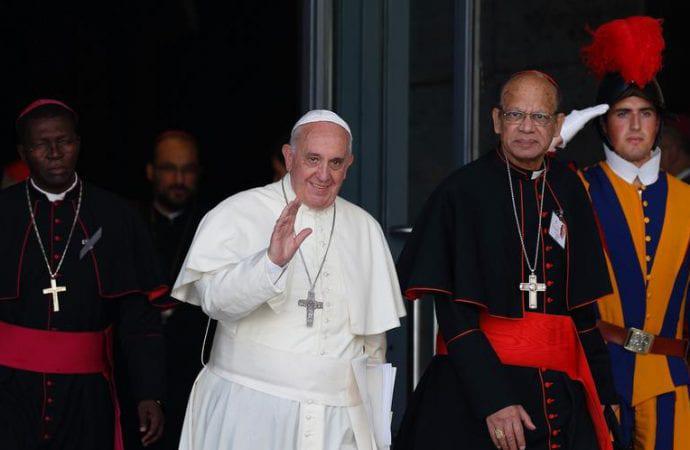|
India cardinal mounts strong defense of ‘zero tolerance’ on abuse
By Inés San Martín
ROME - Cardinal Oswald Gracias of Bombay, India, a member of Pope Francis’s council of cardinals which advises him on Vatican reform and one of four figures tapped to organize a recent summit on the fight against clerical sexual abuse, says Catholic parents have the right to know the Church is genuinely committed to “zero tolerance.” The comment takes on special significance in the wake of the Feb. 21-24 summit, where reservations about “zero tolerance” were heard from senior churchmen from the developing world, and where the pope himself didn’t use the phrase. Some observers detected a creeping redefinition of “zero tolerance” away from what it’s come to mean in the United States and certain other parts of the world, which is near-certain expulsion from the priesthood for abusing a minor, to permanent removal from ministry but not necessarily the priesthood. Asked what “zero tolerance” means to him, Gracias said “it means that I will not condone any case [of abuse of a minor]. Saying sorry doesn’t make it better.” “Zero tolerance means that I know that I cannot expose any children to the risk of a person who’s committed a crime of this nature,” he said. Gracias also said it’s time the Catholic Church is “at the forefront” of child protection. “I think sometimes we’re distracted defending what we’ve done, [but] we have to repair the system so that children are safe,” he told Crux Wednesday. “Every parish, every school, every church-ran facility must be a place where parents know their children are safe,” Gracias said. “Unfortunately, in the past this wasn’t always true.” The cardinal was an organizer of the summit that brought the presidents of the world’s bishops’ conferences and other Church leaders to Rome. Although he thought the meeting “was good, the talks substantial,” Gracias said that he would have liked to see more time for bishops to interact so they could “own the issue.” “I don’t think they felt they were part of the decisions,” he said. That said, he did seem to think it changed some minds. “Before the meeting, I would hear bishops in the hallways saying, ‘This is not my problem,’” he said. “By the end of it, everyone acknowledged this is ‘our problem, the Church’s problem’.” That, in a nutshell, is what Pope Francis told journalists traveling with him in Panama in January was the scope of the meeting: That no member of the Catholic hierarchy could now say, “I didn’t know what to do.” “Now everybody knows,” Gracias said. “The pope summoned us, everybody came, we spoke about it, so no more excuses.” The prelate also said that even though there have been “mistakes, aberrations, we have to accept that,” he questions the fairness of judging people for what they did 20 years ago by the mentality of today. “At that time, we didn’t understand just how big the damage was and the moral impact,” he said. Gracias said that he now looks to the Pontifical Commission for the Protection of Minors to come up with “concrete steps” to follow the summit. The body headed by Boston’s Cardinal Sean O’Malley was the one that proposed the idea of the February meeting, and according to the Indian prelate, they are the ones with the “competence” and knowledge to oversee the follow-up. Aware of the urgency, Gracias is not waiting for directions to begin taking some concrete steps for the Archdiocese of Bombay. In the near future, he will create a center for the protection of minors with professionals of different fields available both for victims and for other bishops. This will follow a step already taken, which is mandatory safeguarding guidelines in Catholic schools. “All the teachers had to sign and accept that this is the policy of the Church,” he said, acknowledging he wasn’t sure at the time if everyone would. But the directive he sent was clear: “You’re either in for the protection of children, or you’re out.” On a global scale, Gracias said that he was “surprised” to find there are bishops’ conferences that still don’t have guidelines for the protection of minors, something Pope emeritus Benedict XVI asked for more than a decade ago. “It’s not that difficult: there’s a general framework, adapt it to your country, and ensure they’re followed,” he said. In addition, every country needs experts to advise the bishops and also a system to assist the victims including counseling, medical attention and legal advice. Gracias was in Rome to participate in meetings of the council of cardinals. He spoke to Crux in Santa Marta, the residence where Francis has lived since the beginning of his pontificate. After more than 30 trips in the past five years, Gracias said that he no longer feels like “a stranger in Rome,” and from his permanent room located one floor down from the pope, he said that Francis is a “quiet upstairs neighbor.”
|
.
Any original material on these pages is copyright © BishopAccountability.org 2004. Reproduce freely with attribution.
